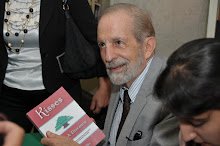AL JADID
A Review and Record of Arab Culture and Arts
COPYRIGHT 2009 AL JADID www.ALJADID.com VOL. 15 No. 61 (2009)
_______________________________________________
Kisses From A Distance: An Immigrant Family Experience
By Raff Ellis
Cune Press, 2007, 312 pp.
Maronite Family Life in Early 20th Century Lebanon, and Journey into America
BY MICHAEL TEAGUE
“Kisses from a Distance” is an intimate chronicle of Raff Ellis’s attempt to reconstruct his family history using as the letters left behind by his mother after her death in 1994. The author’s parents were Lebanese Maronites who made the journey to the United States in the early 20th century, against a backdrop of historical events of enormous significance both within Lebanon and on the global stage.
The dynamic of this book is due in large part to the fact that the author had at his disposal only the letters his mother received from her family and friends, and not the ones she wrote to them. This not only leaves room for imagination but also makes Ellis’s trips back to Lebanon to conduct research as central a theme as his parents’ initial journey to America, giving the work an enjoyably personal feel.
From a historical standpoint, the most interesting aspect of “Kisses from a Distance” is the author’s re-creation of Maronite life in the mountain villages of Lebanon around the turn of the century. Ellis’s mother came from a family of notables while his father was of peasant origin, making for a fairly thorough portrait of day-to-day existence. This is the part of the book where the author resorts to re-creation most often, and he describes the situations and conversations between members of his family as he imagines they must have occurred with great sensitivity.
Equally poignant is the role played by the impending collapse of the Ottoman Empire which, in its death throes, implemented increasingly repressive measures to extract resources from and control local populations. The author also details the ravages of the locust plague of 1915 that brought famine and disease to an already suffering population. The resulting economic deprivations and socio-political turmoil were largely responsible for the departure of Ellis’s parents, and so many like them, to foreign lands in search of a better life.
As is the case with so many who emigrate, however, adjusting to a new and completely different life is often just as difficult and even traumatic as the adverse conditions from which one was fleeing. The depiction of the many setbacks and hardships endured by the Kmeid family in their new life in upstate New York constitutes one of the book’s strongest aspects. For all of the author’s painstaking research into the minutest details of his family’s past, the universality of the story is every bit as important. Indeed, this book could be read by anyone whose ancestors made the trek to America at the time of the chaotic birth of the 20th century.
The movement back and forth between personal and universal also underscores another of the book’s strong points, in that through Ellis’s family history we have a unique window onto the social and political situation of the Maronites after the turn of the century. While sociological and political analysis is mostly beyond the scope of the work, we nonetheless catch a glimpse of conflicts that would eventually play a central role in the civil war years later. The author’s uncle served in the army under the Ottomans and in his letters makes several references to his role in quelling the Druze rebellions during the French Mandate. The tumultuous history of the Druze- Maronite relationship in Lebanon is perhaps well-known and is really not at all a focal point for Ellis, but it adds a layer of complexity to the account. Particularly, since the Maronites were having their own problems with the Ottomans, also represented by Ellis’s uncle, who was an exemplary soldier on the battlefield but who often clashed with his superiors.
Reading this book, one cannot help but wonder helplessly about the other boxes of letters out there collecting dust in the attics and basements of the world, and what these letters would reveal not only about the folks who wrote them but also about the historical events of the times in which they were written. AJ
Subscribe to:
Post Comments (Atom)




No comments:
Post a Comment